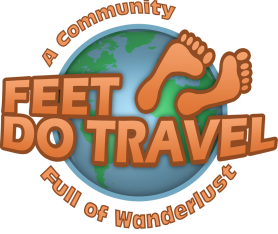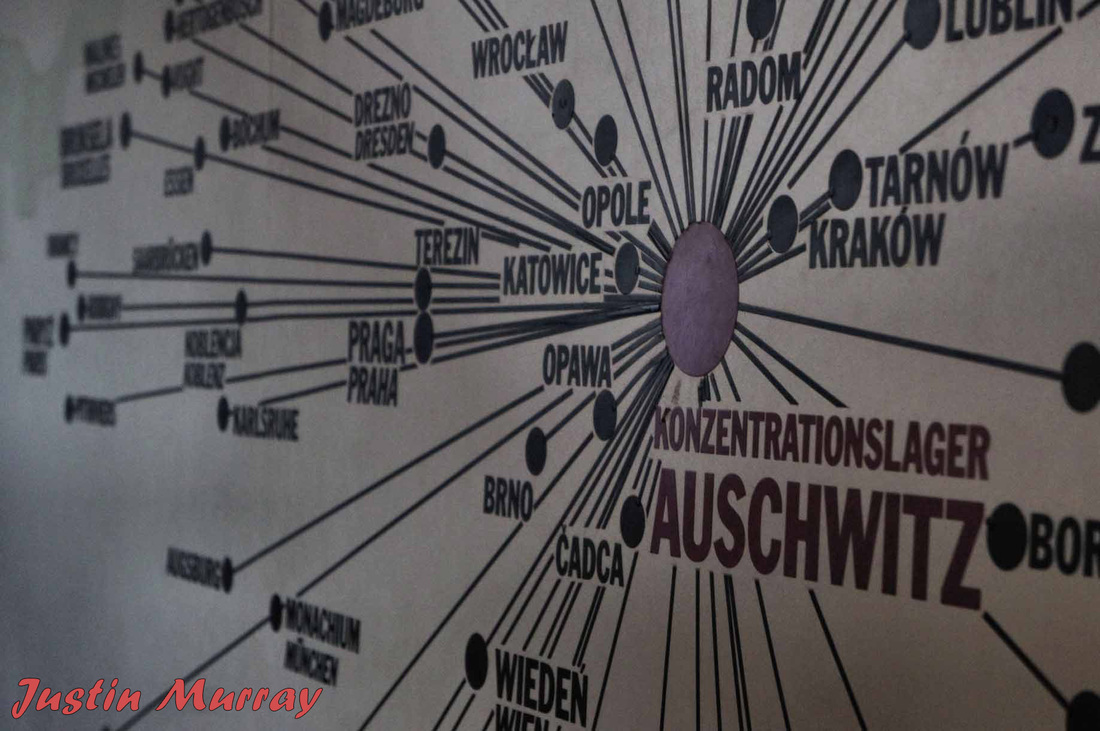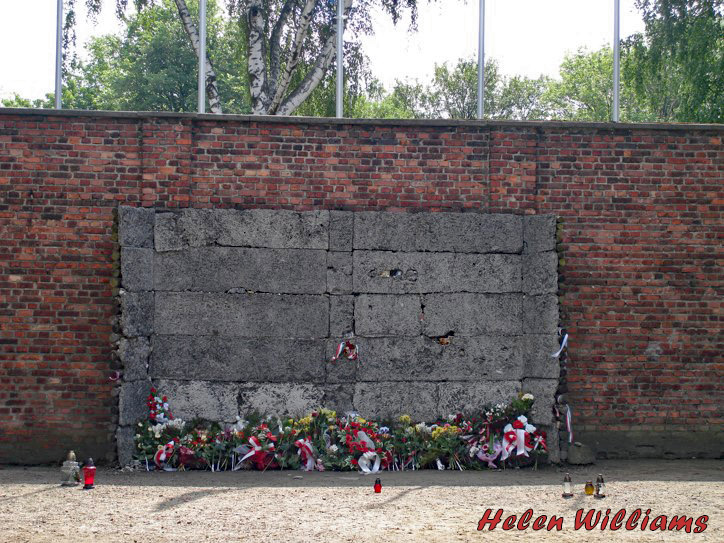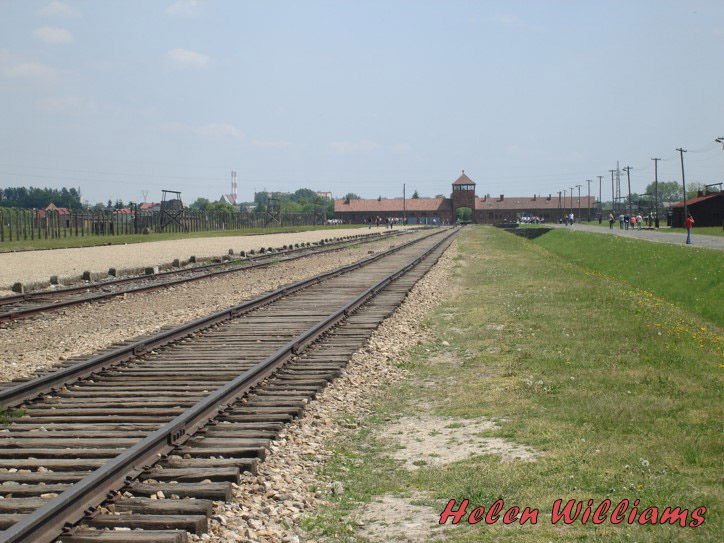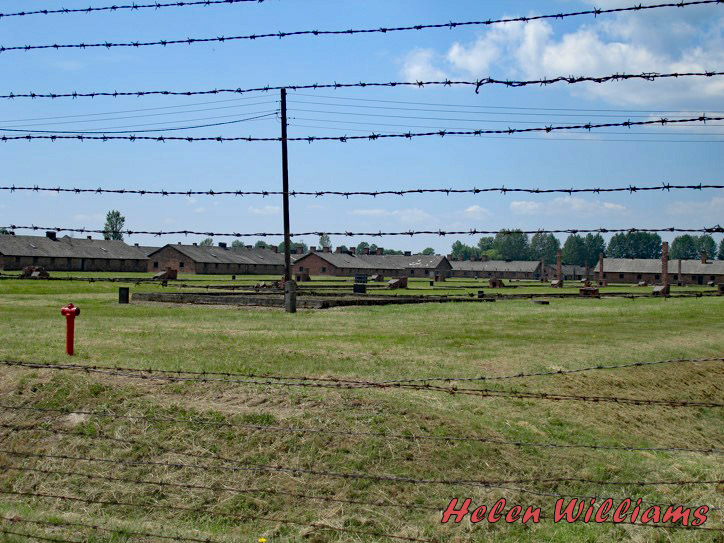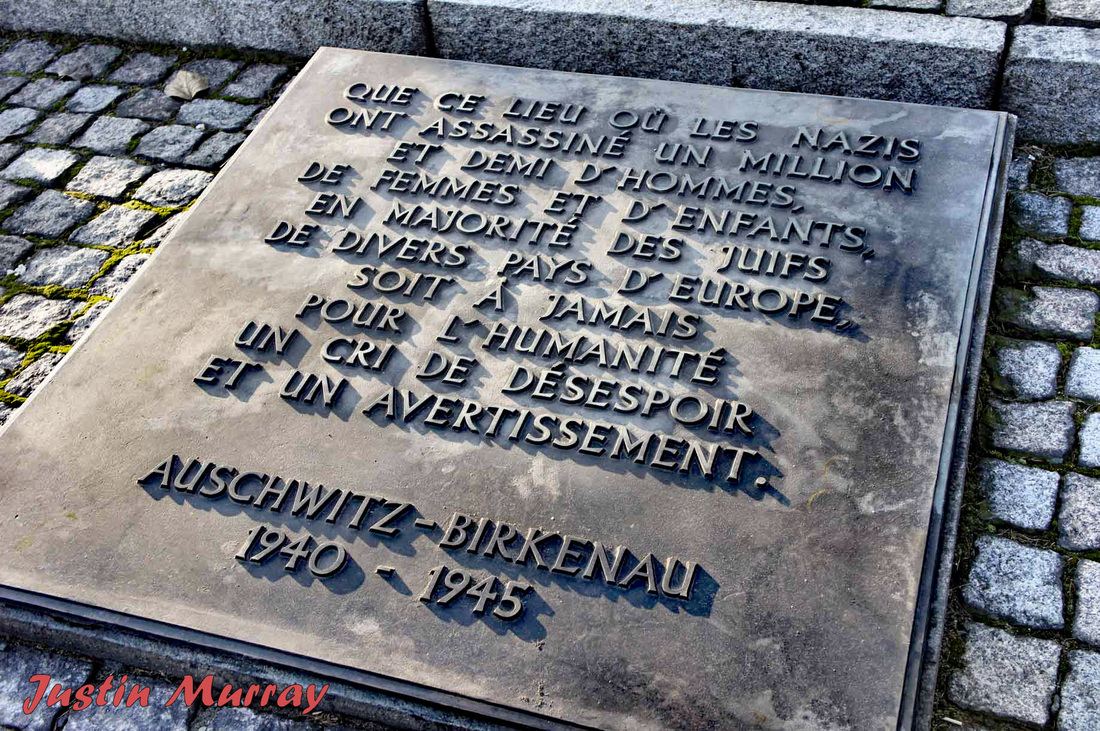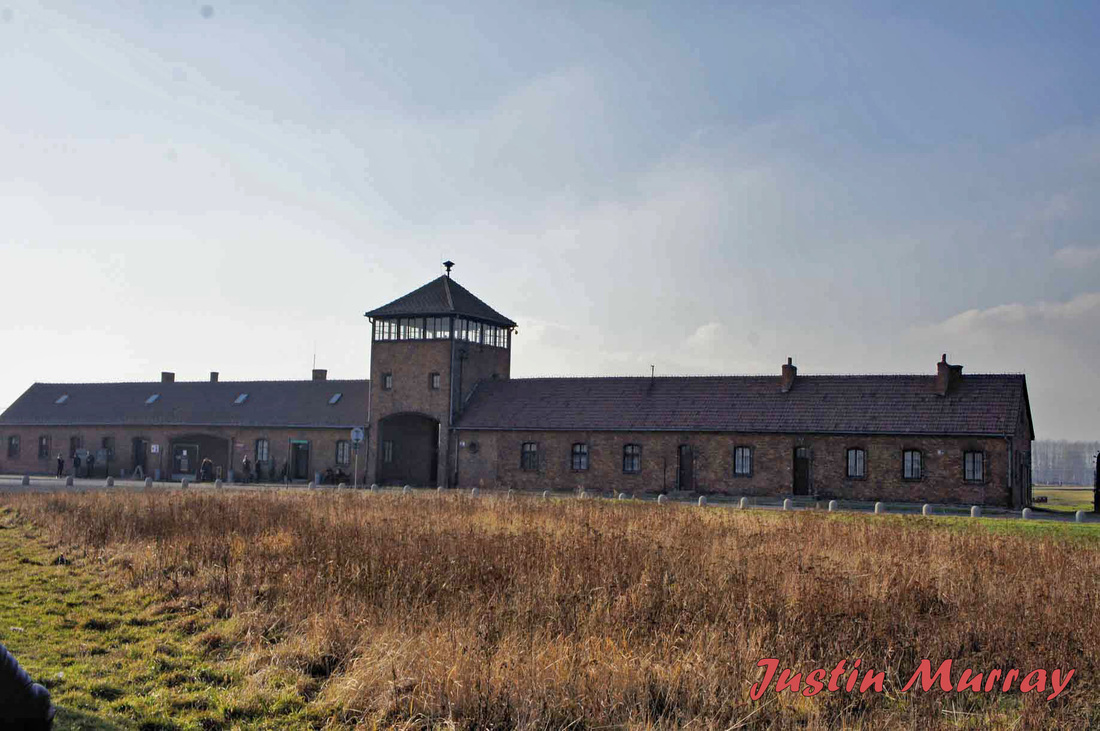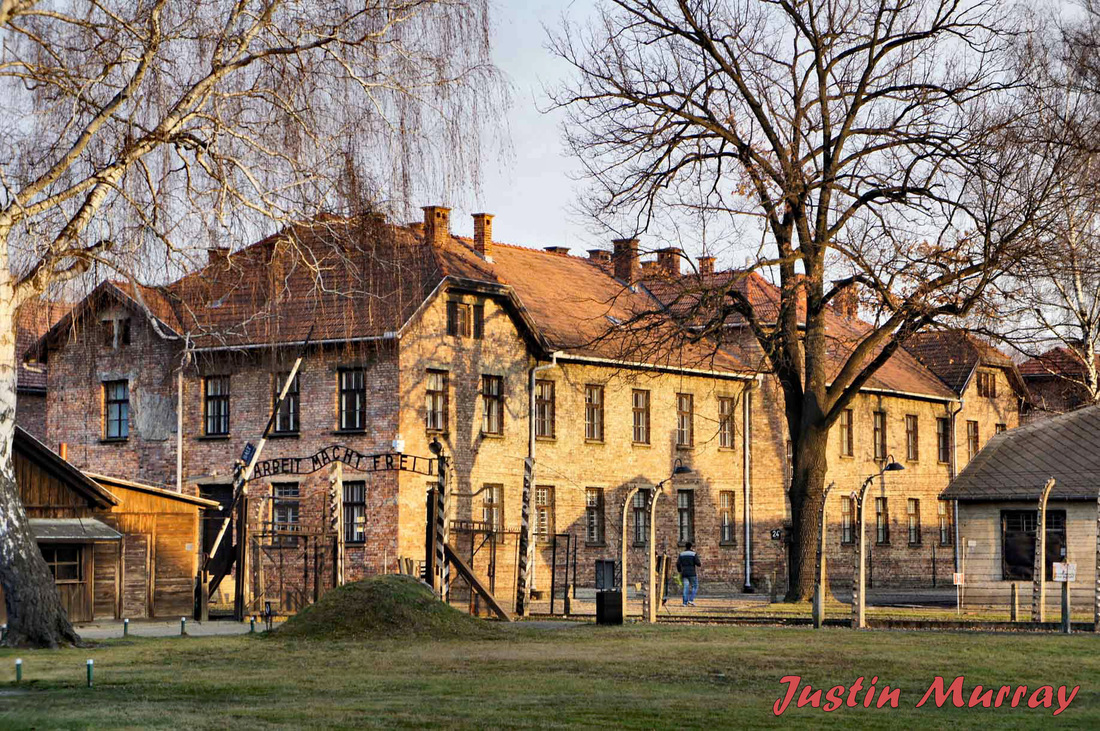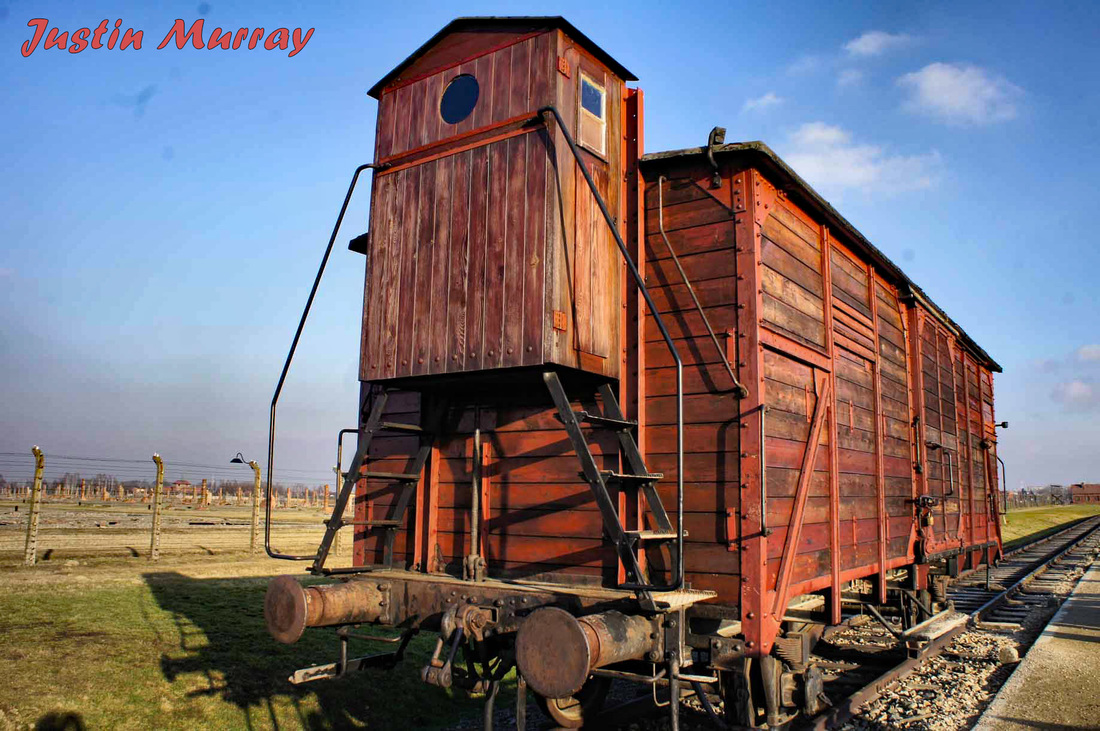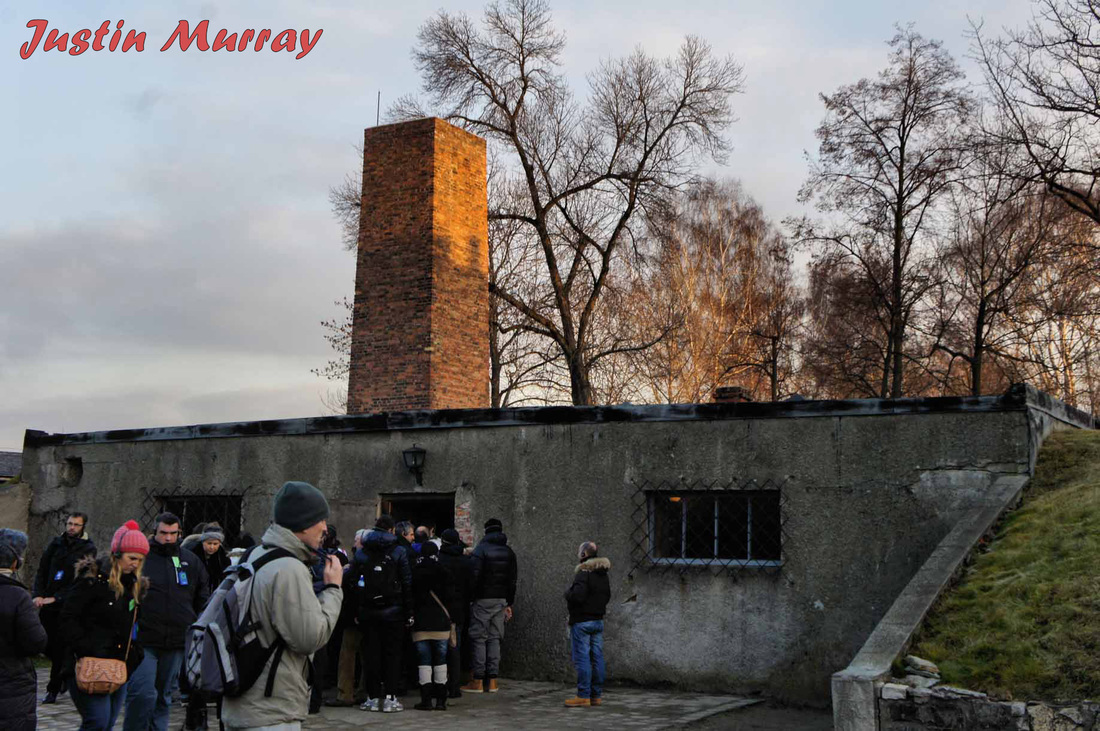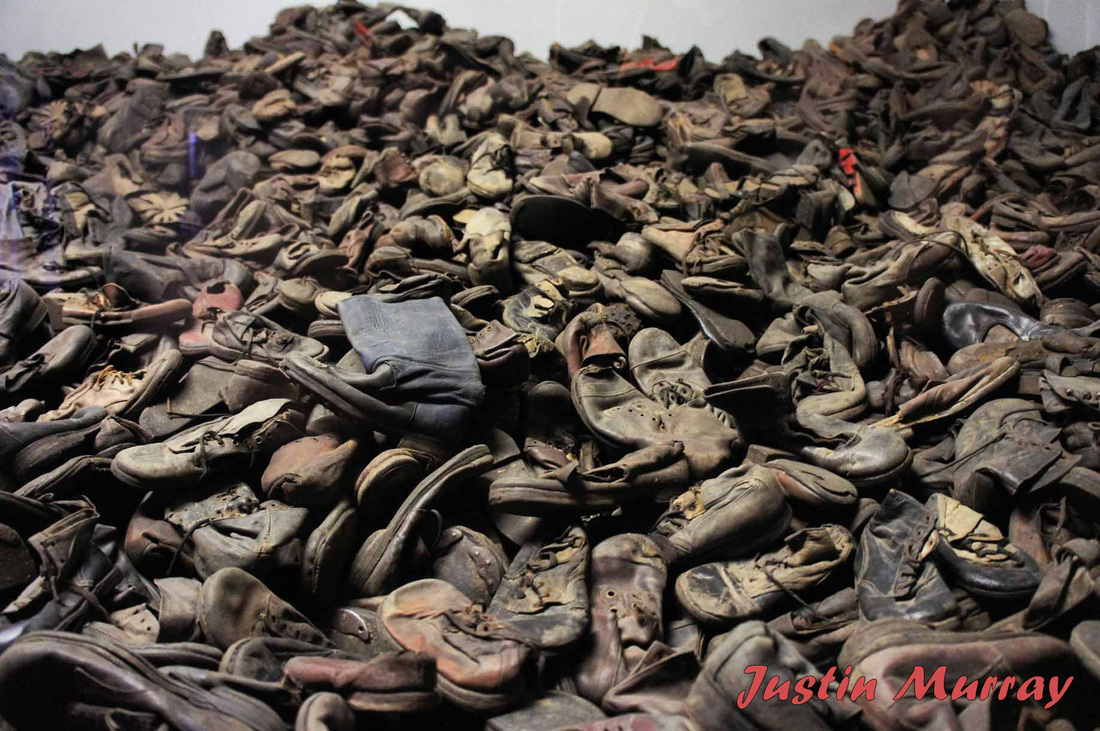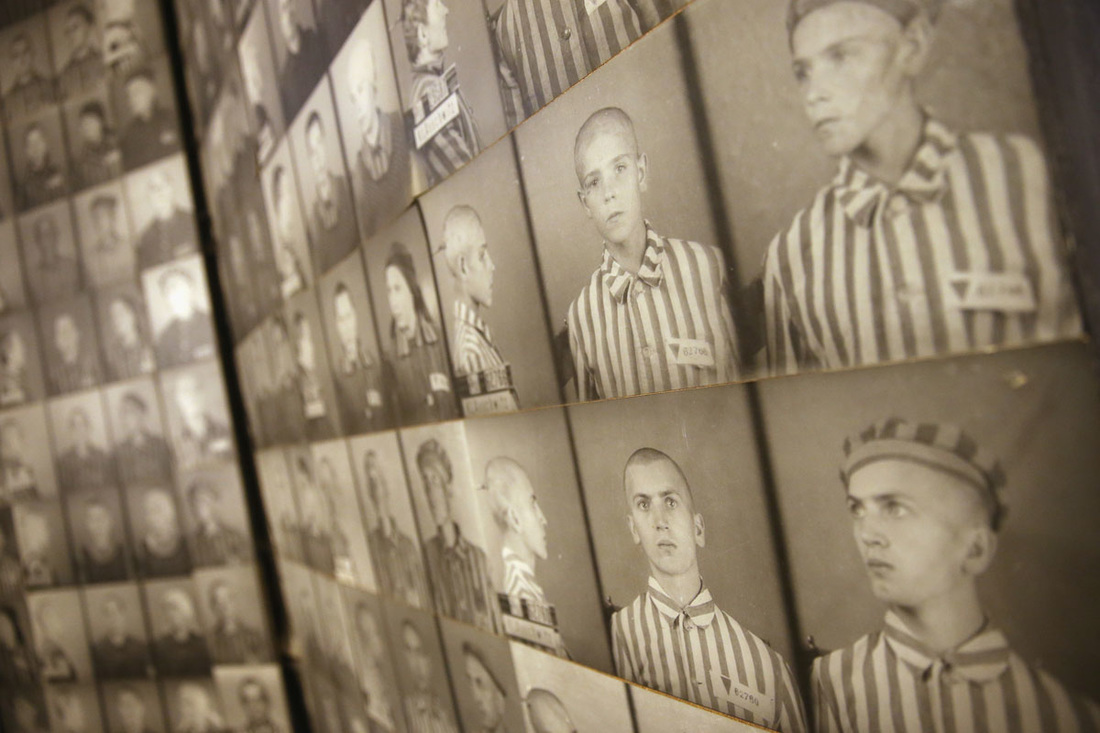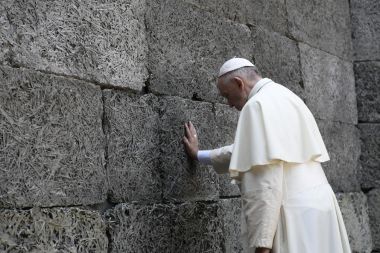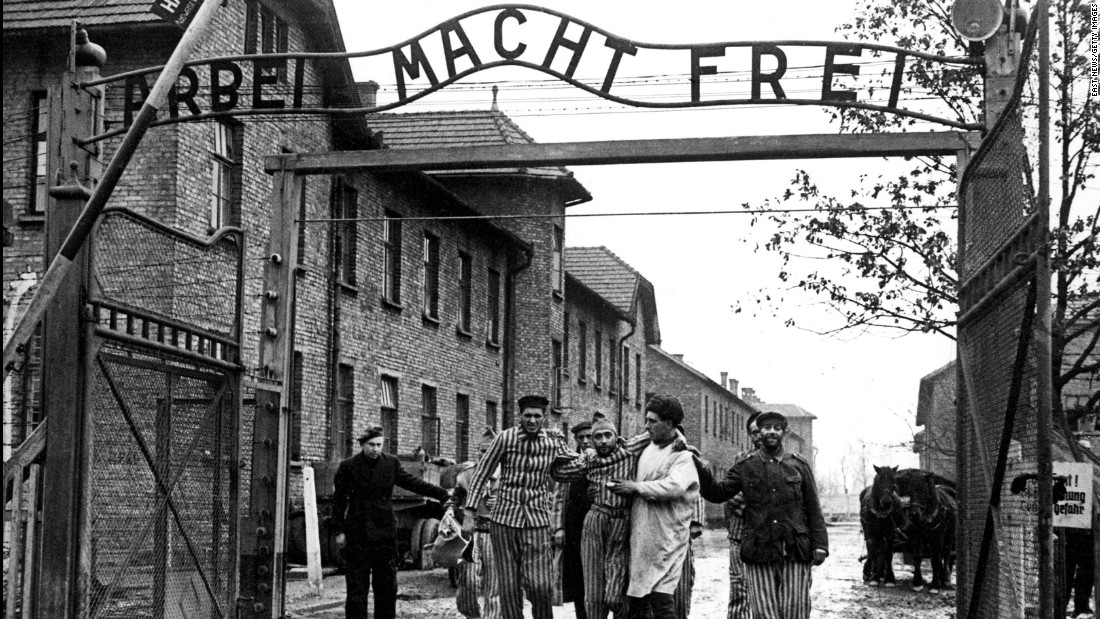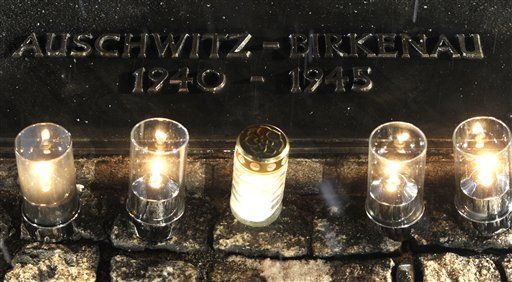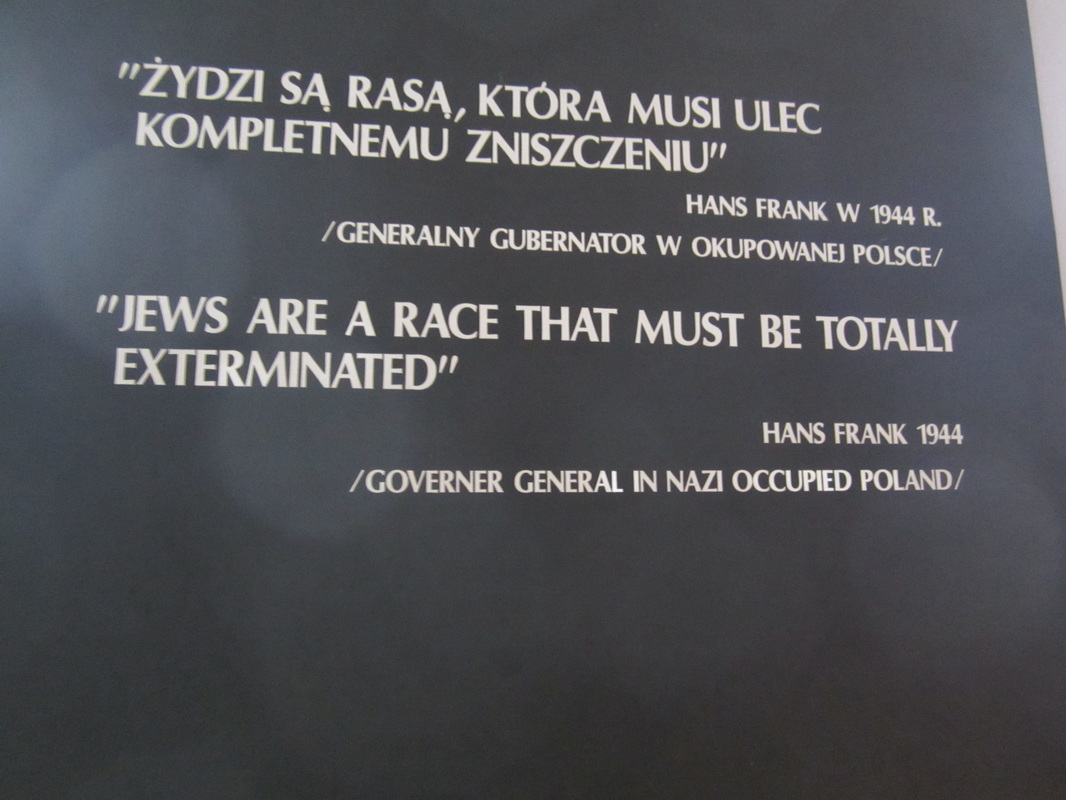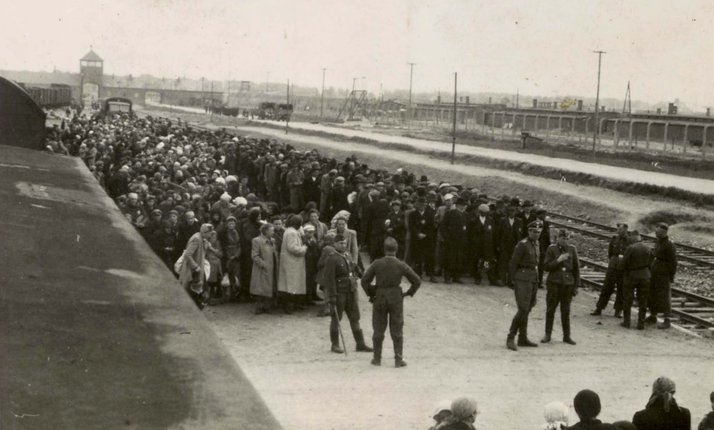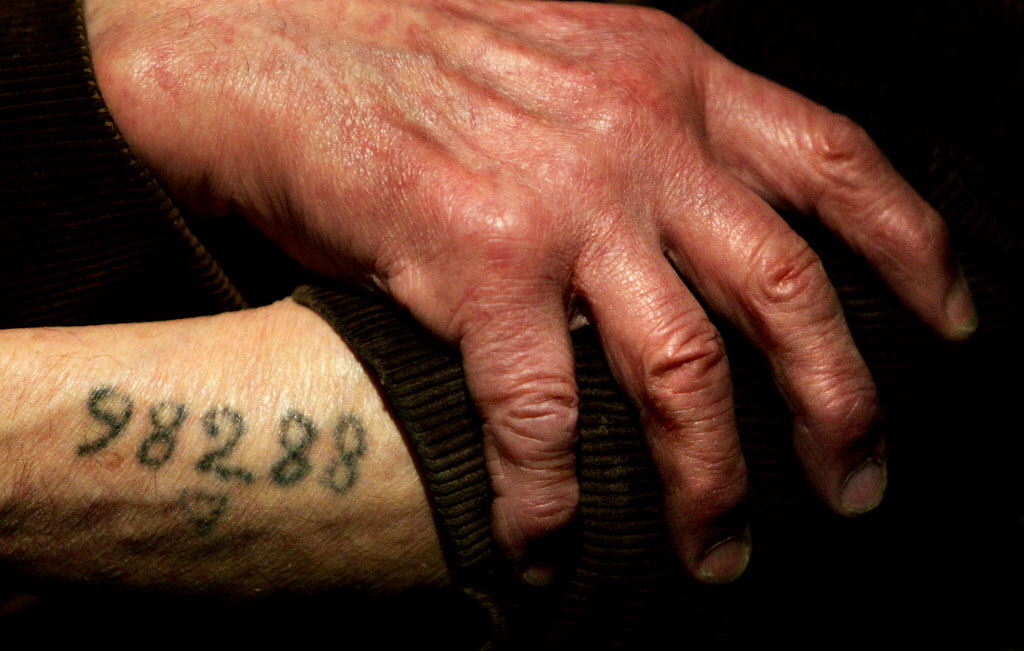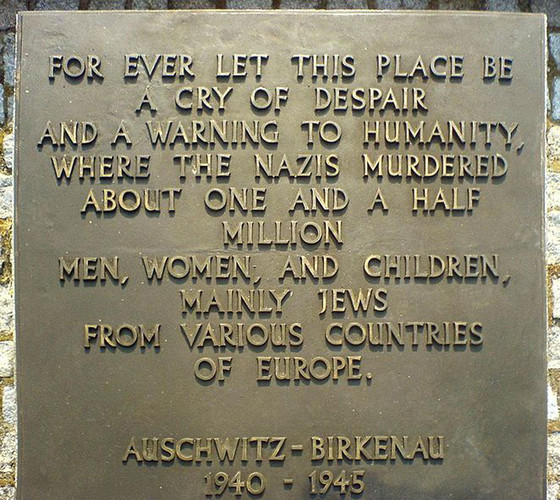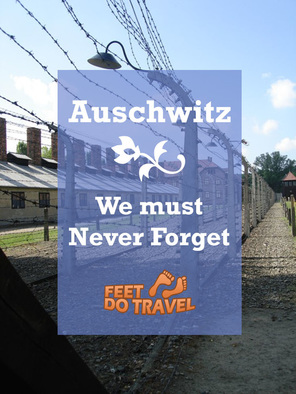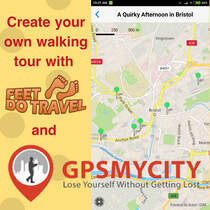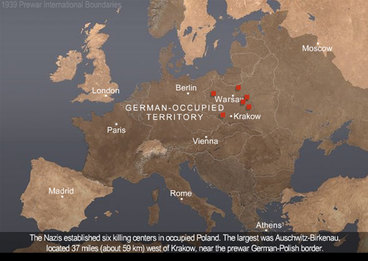
We need to ensure this never happens in our world again. Ever!
Under orders of the German Nazi Government leader Adolf Hitler, three main concentration camps were established during World War II near the Polish city of Oswiecim (Auschwitz in German), approximately 60km west of Krakow. Their sole purpose was to imprison and exterminate human beings. To be precise, all were Jews… but none the less, they were all humans.
Adolf Hitler personally ordered the mass extermination of the Jews. In the personal diary of Joseph Goebbels, the Minister of Propaganda who served Hitler and helped spread the Nazi message, Goebbels wrote “With regards to the Jewish question, the Fuhrer decided to make a clean sweep …”
• Auschwitz I opened May 1940 – it covered 40 square kilometres
• 3 September 1941 – the first set of gassings of 600 soviet prisoners of war
• Auschwitz II (also called Auschwitz-Birkenau) opened 1 March 1942 - solely built to kill the prisoners
• Auschwitz III (also called Auschwitz-Monowitz) – construction began October 1942 but is now an industrial park who make synthetic rubber and plastics there and still do to this day
The sections were separated by barbed-wire fences and Auschwitz II had the largest prisoner population of any of the three main camps. In January 1942, the first chamber using lethal Zyklon B gas was built on the camp, however it was judged inadequate for killing on the scale the Nazis wanted so four further chambers were built. These were used for systematic genocide right up until November 1944, two months before the camp was liberated.
On 27 January 1945 Soviet soldiers entered the gates of the complex to close it down but the site had been evacuated by the Nazis just days earlier.
The largest mass murder in a single location in human history was now over.
Around 7,000 prisoners were found alive and starving, but the Soviet troops found much more grisly evidence of the horrors that took place. Millions of items of clothing which once belonged to men, women and children were discovered along with 6,350kg of human hair. The Auschwitz museum holds more than 100,000 pairs of shoes, 12,000 kitchen utensils, 3,800 suitcases and 350 striped camp garments. Sadly, this is not the limit of the horrors. It was also the site of disturbing medical experimentation on the prisoners which included castration, sterilisation and testing how they were affected by contagious diseases. The infamous “Angel of Death”, SS captain Dr Josef Mengele was one of the physicians practising here. His particular interest was experimenting on twins.
We will never know exact numbers, however according to the US Holocaust Memorial Museum, at least 960,000 of the 1.3 million Jews deported to the camp were killed. Other victims included approximately 74,000 Poles, 21,000 Roma, 15,000 Soviet prisoners of war and at least 10,000 from other nationalities.
An interview with some of my friend’s detailing their Auschwitz experiences
I haven’t yet had a chance to visit Auschwitz so I reached out to a few people whom I know have been. I wanted to compare their experiences by asking the same set of questions.
Helen’s visit
Hello Helen, and thank you for agreeing to talk to me about your visit to Auschwitz.
How many years ago did you visit Auschwitz?
8 years ago, I visited in 2008
What was your reason for wanting to visit?
I felt it was somewhere our generation should all visit. Acknowledging the atrocities that happened there is important to prevent the same ever happening again.
Just a couple of questions to help paint a picture of the day. What was the weather like and do you think this had an effect on your mood and the whole ambience?
I had just been on a great girlie weekend in Krakow. The others had flown back to the UK that morning and my flight home to Germany wasn’t until the evening so I decided to go on an organised trip. I did feel the irony of standing on the side of the road with my suitcase waiting to go to Auschwitz.
The sun was out that day and it was very hard to imagine the bleakness of the place.
Were you part of a tour or self-guided?
English guided tour.
Were there many people around or were you alone at any time for the experience?
There were a lot of people visiting that day although you could still find quiet areas for reflection.
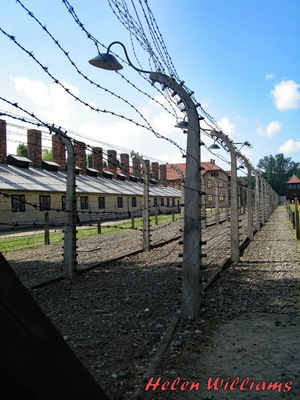
I was trying to put the scale of atrocities into proportion. They believe one and a half million people were murdered on this site. I was trying to understand the scale of it. I was also trying to comprehend how any normal person could have become a killer.
Did you go to both Auschwitz 1 the museum & Birkenau, the camp?
I think I went to both. The camp has the most striking memories though.
Can you describe your first impressions as you walked up to the entrance and in through the gates?
I actually had a sense of nervousness as I went through the gates. The place was bustling and it was hard to imagine what the prisoners would have been thinking as their train pulled in.
The most shocking image for me was the hair that had been cut off bodies and piled up. There was so much of it. Also the piles of suitcases with people’s names on them. It just made it all seem real rather than just stories and numbers.
Did you take any photographs?
Yes I did
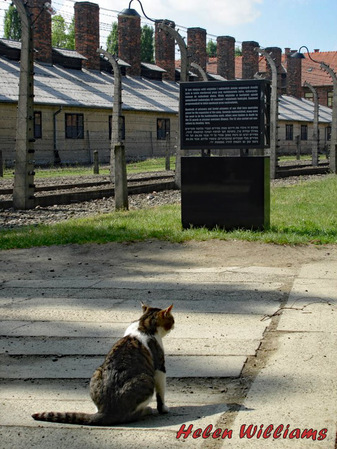
When you walked away, what were you feeling and what lasting impression was left with you.
I remember feeling sad. I was shocked how the Nazis could treat human beings like animals or worse. However I was glad I had gone.
I had previously visited a couple of concentration camps in Germany where I lived but the difference here was the scale of atrocities. The Nazis, with their usual German efficiency had planned and carried out extermination of a race of people.
Do you have any advice to pass onto others who wish to visit?
I would recommend a guided tour. The stories we heard were incredible. I would also recommend having a bit of extra time to walk back around and reflect.
Justin’s visit
How many years ago did you visit Auschwitz?
I visited Auschwitz in December, 2013
What was your reason for wanting to visit?
It was part of a tour package. And, before I went, I had thought it would be ‘interesting’ to visit, but I never really had a drive to go visit a prisoner of war camp.
Just a couple of questions to help paint a picture of the day. What was the weather like and do you think this had an effect on your mood and the whole ambience?
It was a clear and cool December day. Very few clouds and the sun shone brightly. There were also touches of snow hidden in some of the shadows surrounding both Auschwitz and Birkenau.
Were you part of a tour or self-guided?
Oddly enough, I was part of a “party-tour”. That’s not an official classification for this tour as it was a good mix between experiencing history and nightlife in each of the stops. It was a Christmas/New Year’s tour through Eastern Europe with Busabout.
Were there many people around or were you alone at any time for the experience?
I wouldn’t say there were “many people” compared to most touristic sites out there, but there wasn’t ever a point when our group was alone, never mind being alone by ourselves. There were a few other tours and a few small groups of visitors.
Did you go to both Auschwitz 1 the museum & Birkenau, the camp?
We visited Birkenau first because other tour buses had pulled in to Auschwitz before we had arrived, and we were trying to avoid the crowds. I believe we were there for around 3-4 hours.
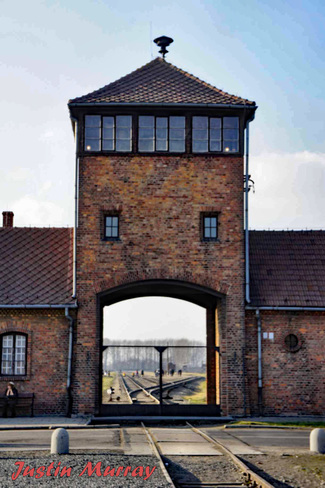 The main gates of Birkenau
The main gates of Birkenau Can you describe your first impressions as you walked up to the entrance and in through the gates?
I think it’s important to explain something about the tour I was on and the important role the tour guide played in introducing us to Auschwitz and Birkenau. After partying with the same group of people for almost a week straight, hitting Prague, Vienna and Budapest, we were about to stop in Auschwitz before heading on to Krakow.
Our tour guide did an excellent job of easing us in to, what was about to be, a rather brutal change in atmosphere. I mostly just remember him saying that everyone is going to react and experience Auschwitz differently and that it’s important to respect others both during and after our visit. All goofing-around and immaturity vanished after that point.
So, when we got off the bus and walked towards the gate in Birkenau, I was already in a sombre sort of mood. Then, when I saw the main gates of Birkenau, I recalled every documentary I watched in high school about the war camps and the looming brick gate with the portal, large enough for a railway car to fit through. I already knew what I was going to learn once inside. I was just a little surprised by the emotions.
As you were walking around, can you recall what thoughts you were having?
They were mixed emotions to be sure. On one hand, we studied World War 2 and the Holocaust in High School, but that was more about numbers of victims and an attempt to imagine the horrors. So, I was already sort-of desensitized to the history and horrible stories of the war camps. There were a few “oh my God” moments, when standing in the gas chamber for example, or seeing the actual ‘ovens’ for the first time.
Was there something you experienced in particular that shocked you the most? Why was this the most shocking out of everything?
After hearing the stories and seeing where the prisoners were kept in Birkenau, the whole desensitization had really set in for me. Auschwitz looked more how I had seen in movies about the prisoner of war camps, so it started off as more interesting, than shocking. It wasn’t until we walked in to the museum at Auschwitz when the reality of all the stories really hit me. There are a few rooms in the museum which have a fraction of the ‘remains’ of the victims of these death camps. In one room it was a massive pile of shoes, in another, it was piles of suitcases with people’s names written on them, another room had the victim’s prosthetic limbs ...but there was one room which really shocked and truly disgusted me: the room with the hair. This room had a massive pile of women’s hair that had been shaved from their heads before they had been gassed. It really turned my stomach…it was so horrible that I had to look away.
Did you take any photographs?
I took quite a few photos of both camps. I like to think that I took the photos for my friends back home in Canada who would likely never make it over to see this place. In reality though, I took the photos more to remind myself. I just looked through these photos again so that I might answer your questions a little better — and it really is surprising how quickly all these emotions came flooding back!
When you walked away, what were you feeling and what lasting impression was left with you?
I do remember being on the bus heading to Krakow, trying to process everything I had just seen and heard. During that quiet moment, I realized that a bus full of party-people had all been stunned in to silence by the horrors of Auschwitz. It was at that moment that I was “glad” I went to Auschwitz; it’s very important to “experience” history as best we can. “Those who don’t know history are destined to repeat it.”
Do you have any advice to pass onto others who wish to visit?
A bit of travel guide advice: if you arrive and there are half-a-dozen tour busses pulling in ahead of you, definitely go to the nearby coffee-shop/place to eat. The last thing you want is for crowds of people to take away from your experience there.
As for advice about emotions: definitely give yourself and your travelling companions some time afterwards to reflect on what you have seen. Our tour guide had said to us beforehand that everyone is going to have a different reaction to what they will experience at Auschwitz. Be very respectful to this process in others as Auschwitz is a place that will change all of you.
Paul’s visit
How many years ago did you visit Auschwitz?
December 2012, so 3.5 years ago.
What was your reason for wanting to visit?
I was on a one week city break in Kraków
Just a couple of questions to help paint a picture of the day. What was the weather like and do you think this had an effect on your mood and the whole ambience?
The weather was clear and sunny, temperature around -5 during the day, dropping to -15 at night. There was a covering of snow, walkways were an inch or so, and the surrounding areas had up to a foot. Being VERY cold definitely added the angle of what it must have been like in the dead of winter.
Were you part of a tour or self-guided?
Our hotel organised transport there, then on arrival we joined a tour group. All visitors that were part of a tour group wore headsets, which seemed odd at first, but as the tour progressed it became quite clear as to the reason. I thought was very well orchestrated.
Were there many people around or were you alone at any time for the experience?
There were plenty of areas where you could be alone, but inside the buildings and museum areas it was very busy, but not so busy that is was claustrophobic. The guides were very good at making sure areas weren’t clogged. Having headsets meant you could just concentrate on the tour guide’s voice and I found this gave me a very personal experience, even though our group numbered 20+ people, to me, it felt one-to-one.
Did you go to both Auschwitz 1 the museum & Birkenau, the camp?
Auschwitz first, then Birkenau. We were there around three hours, it was plenty of time. We could have spent longer there, but had transport arranged to take us back to Kraków.
Can you describe your first impressions as you walked up to the entrance and in through the gates?
A feeling of disbelief that I was actually going to walk under the “Arbeit Macht Frei” sign. Many hundreds of thousands of people took those same steps to their deaths. Quite surreal.
As you were walking around, can you recall what thoughts you were having?
Very sad thoughts, despite all the pictures, and stories, it’s so hard to comprehend what went on there. To this day, I still can’t get my head around it. To some extent, for the SS guards, it must have become normal, they must have been numb to the deaths. The smell, yuck, I guess some dealt with it by choosing to ignore what was going on. It’s interesting because rather than think about the poor souls who were sent to their deaths, or worse experimented on, my thoughts were primarily around, how, why, can so many humans do this to so many other humans.
Was there something you experienced in particular that shocked you the most? What made this the most shocking out of everything?
The gas chambers, so distressing, jaw dropping, a conveyor belt to death.
Did you take any photographs?
No, and I don’t recall that many people were. I can’t remember if there was a no photograph rule, but that would make sense.
When you walked away, what were you feeling and what lasting impression was left with you?
My thoughts in general were disbelief, and as we drove back to Kraków, I wondered if it was possible for every single human being on this planet now, and in the future, to visit this place. You can read, look at photos, and watch film, but it doesn’t come close to being there. There were four of us on this trip, close friends for 10+ years and I recall how quiet the journey back to Kraków was. We were all deep in thought, reflecting on what we just witnessed, other than small talk like, “oh my, how terrible was that”. We didn’t really talk about it.
Do you have any advice to pass onto others who wish to visit?
Definitely join a tour group, be brave, take it all in, listen carefully, don’t rush and allow plenty of time. If you can, whilst you are there, find the time to be alone and allow your mind to process the information.
David’s visit (from Travelswhere)
How many years ago did you visit Auschwitz?
I actually just visited Auschwitz Birkenau this September (2016), as part of my travels throughout Poland.
What was your reason for wanting to visit?
I don’t really have any strong personal connection to the place. I wanted to visit the place where an incredibly important historical moment happened and try to understand/comprehend what the people went through and how they may have felt. Having talked to friends who had visited Krakow, they had said it was something you absolutely shouldn’t miss. I almost felt obliged to visit.
Just a couple of questions to help paint a picture of the day. What was the weather like and do you think this had an effect on your mood and the whole ambience?
The weather all day was warm with bright, sunny skies. Talking with another person on my tour we both agreed that it contrasted with the sombre tone of our visit, probably better reflected in winter. Bitter cold, wind and thick mud felt more appropriate than cheerful blue skies, especially considering how many of the transports arrived during winter.
Were you part of a tour or self-guided?
I joined a guided tour from Krakow that took the group through Auschwitz main camp and the Birkenau camp. I think having a guide not only informed us, but having them take us through helped give direction to our visit, ensuring we saw the important sections.
Were there many people around or were you alone at any time for the experience?
At both camps, there were several other tour groups passing through at the same time as ours. This caused some parts to feel a little rushed and busy, but I never felt like we “missed” something because of the crowds. I do think that having fewer people about may have come with a feeling of isolation and a reminder of the number of lives lost.
Did you go to both Auschwitz 1 & 2 (Birkenau)? And if so, in which order did you see them i.e the camp first then the museum or vice versa?
Our visit started with a guided tour of the “museum” at Auschwitz 1 and then we were taken to Birkenau for our second guided visit.
(If you did both camps) It’s a very large site, do you remember how long you were there for in total?
We arrived at Auschwitz 1 from Krakow at about 10am and spent close to 2 hours there. Afterwards we had a short break, before driving over to Birkenau, where we spent about 1.5hours. We left to return to Krakow around 2.15pm.
Can you describe your first impressions as you walked up to the entrance and in through the gates?
As we had watched an informative video on the bus there, I felt a bit prepared for that first arrival, but it still felt like a bit of shallow museum at first, even as I stood at the gates. I think I looked at the gates in a different way when I left. Part of the reason for my bland first reaction was that I was surprised at how well maintained the place looked. I thought a place of such misery would have surely been destroyed.
As you were walking around, can you recall what thoughts you were having?
Walking about, there were a lot of things going through my mind, naturally. A lot of them concerned what it must have been like for those that were sent to the camps and to keep paying attention despite how upsetting the subject matter. But my thoughts did also jump to things like what the locals would have thought or known about the place, or that the Nazi soldiers must have felt some sort of shame for them to try and bury the evidence of their crimes under rubble. I think a big part of visiting Auschwitz is the thoughts and questions that it raises in you.
Was there something you experienced in particular that shocked you the most? Why was this the most shocking out of everything?
I think there are two places where I most felt my surroundings. The first was the room of hair, where piles and piles of shorn hair from those imprisoned is exhibited. This put a distinctly human touch on what we were seeing in the museum. The place that really shocked me though, was the reconstructed Gas Chamber. The idea that we were walking through a place where thousands of people had been murdered was almost too much to properly process.
Did you take any photographs?
I did take photos for the most part. At some times it was just as a reminder of what things looked like. Other times, it was because certain parts actually looked quite pretty, such as the brick buildings and summery trees of the museum. The only time I didn’t feel right taking photos was during the walk through of the reconstructed gas chamber. It just didn’t feel personally appropriate.
When you walked away, what were you feeling and what lasting impression was left with you?
Honestly, I felt drained. Just emotionally drained after hearing about death, suffering and pointless misery for hours on end. I came away from the visit with a better appreciation of the sheer scale of the operation at Auschwitz Birkenau and the seemingly endless cruelties the prisoners suffered. Despite it all, I was thankful that I had visited.
Do you have any advice to pass onto others who wish to visit?
If you’re visiting Krakow, go. As heavy as the content is emotionally, you will learn quite a bit and come to appreciate the sites. Also, by going you help keep the site open as a reminder of one of the world’s worst crimes. I would recommend taking a fully guided tour, rather than just getting transport, as you’ll better understand and appreciate what you are seeing. Lastly, it may sound cheesy, but watch Schindler’s List. People will make reference to it and Birkenau was actually used in the movie, so it will give a little context to the day.
Thank you for taking the time to read this blog, we know it isn’t an easy one to read – but it is very important. As per the quote from Edmund Burke - “Those who don’t know history are destined to repeat it.”
If you have been affected by this interview and would like to participate in ensuring these atrocities never happen again, please click onto one of the following websites.
The Auschwitz Institute for Peace and Reconciliation
Holocaust Educational Trust
The National Holocaust Centre and Museum
Please Pin & Share this post,
so the world may learn from these atrocities.
